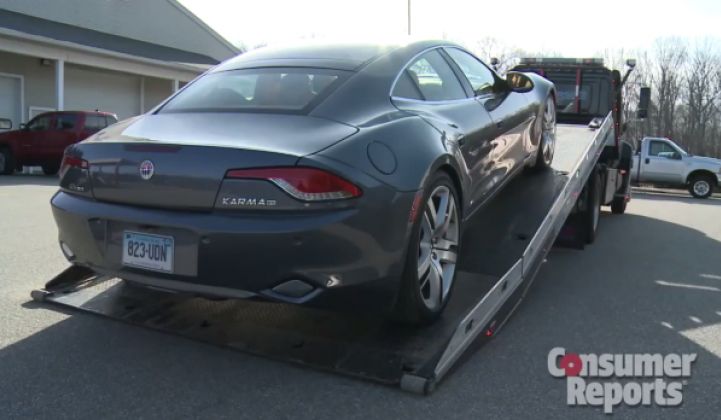Fresh on the heels of Chinese auto manufacturing giant Wanxiang securing its controlling stake in bankrupt U.S. battery maker A123, we’ve got reports of another pan-Pacific deal that could take struggling plug-in hybrid electric car maker Fisker Automotive under the wing of a Chinese owner.
Specifically, Reuters reported Monday that China’s Zhejiang Geely Holding Group is now leading in bidding to take a majority stake in Fisker, citing two anonymous sources. Geely, which also bought Swedish automaker Volvo in 2010, is leading other potential buyers, including Chinese state-owned Dongfeng Motor Group, in offers ranging from $200 million to $300 million for a controlling share of the Anaheim, Calif.-based startup. Both Fisker and Geely declined to comment to Reuters on the reported bid or the figures involved.
It's quite a sobering figure, considering that Fisker has raised nearly $1.2 billion in private investment since its 2007 founding. Much of that has come in the last year, including $380 million from Kleiner Perkins and NEA in the first half of 2012, as well as now-defunct investment firm Advanced Equities -- Fisker raised $103 million of a $150 million round from Advanced Equities in the third quarter, according to this SEC filing).
At the same time, Fisker has been struggling amidst a very public set of troubles, including production delays, storm-related losses, bad reviews and recalls of its $100,000-plus Karma plug-in sports car. It’s also been denied ongoing access to a $539 million Department of Energy loan meant to build a factory for the startup’s promised $55,000 plug-in sedan, the Atlantic. Fisker has drawn down about $192 million of that loan, but it has stopped work at the Delaware site and laid off about half its workforce.
In December, new CEO Tony Posawatz told the Wall Street Journal that Fisker had hired Evercore Partners Inc. to find potential partners or investors from the automotive industry. Posawatz, the former head of GM's Chevy Volt program, is the third chief executive for Fisker in the past twelve months -- co-founder Henrik Fisker was replaced as CEO by former Chrysler Group chief Tom LaSorda in March.
Evercore also helped General Motors through its own bankruptcy restructuring, but Posawatz said in December that bankruptcy wasn’t part of Fisker’s plans. Fisker has certainly been entangled in the bankruptcy troubles of A123, which supplies the lithium-ion batteries for its vehicles, however.
A123’s massive battery recall last year involved batteries for the Karma, and the startup accounted for one-quarter of A123’s revenues at the time of its September bankruptcy filing. Posawatz told the Wall Street Journal in December that the company had only about 100 battery packs from A123 available -- enough for service and repair, but not enough to restart production.
Wanxiang, which outbid U.S.-based Johnson Controls with a $256 million bid to take control of A123’s non-government and military assets, could restart production to fill Fisker’s needs. Fisker said in late January that it was awaiting the opening of A123’s Livonia, Mich. battery plant to restart Karma production. About 1,500 Karma models have been sold to date.



